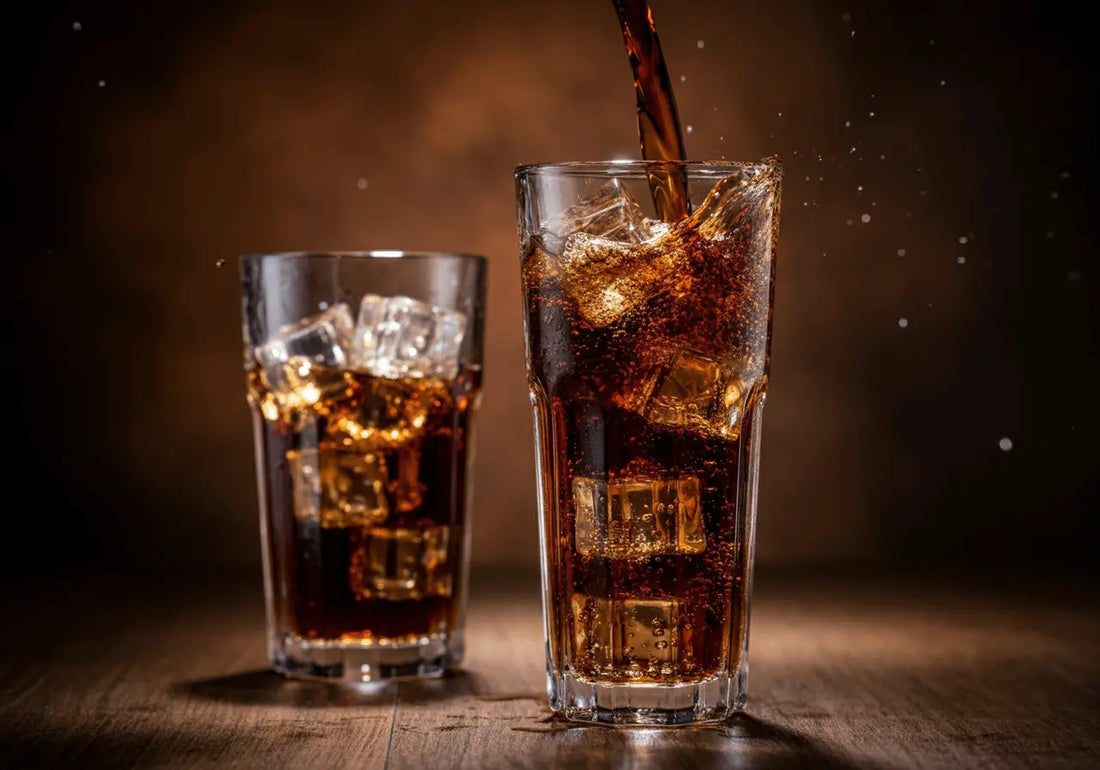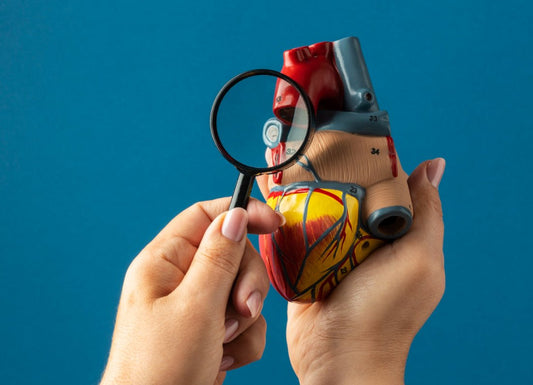Does Soda Cause Kidney Stones? Here's What You Need to Know
 Written By
Abel Tamirat, MD
Written By
Abel Tamirat, MD

You’ve probably heard that drinking plenty of water can help prevent kidney stones. But what about the drinks many of us consume in place of water, particularly soda? If you regularly reach for a can of cola, it’s time to understand how that habit may be impacting your kidneys.
Kidney stones are painful, often recurring, and increasingly common. While multiple factors contribute to stone formation, recent studies point to a significant link between sugar-sweetened sodas and kidney stone risk, especially in individuals with underlying metabolic issues or a family history of stones.
In this article, we’ll break down what kidney stones are, how soda contributes to their formation, and what you can do to protect your kidneys.
What Are Kidney Stones?
Kidney stones are solid mineral and salt deposits that form inside the kidneys when the concentration of certain substances in urine—such as calcium, oxalate, or uric acid—becomes too high. Without enough liquid to dilute them, these substances begin to crystallize and form stones.
Some stones remain in the kidney, while others travel through the urinary tract. Smaller stones may pass with minimal discomfort, but larger stones can cause sharp, intense pain, urinary blockages, and—in severe cases—kidney damage.
Common Types of Kidney Stones
-
Calcium Oxalate Stones – The most common type, often linked to diet and dehydration.
-
Calcium Phosphate Stones – May result from high urine pH or certain kidney conditions.
-
Uric Acid Stones – Often related to high-protein diets and low urine pH.
-
Struvite Stones – Typically caused by urinary tract infections.
-
Cystine Stones – Rare, genetic, and due to inherited metabolic disorders.
Related: Learn about how to reverse kidney damage from diabetes
Who’s at Risk for Kidney Stones?
You may have a higher risk of kidney stones if you:
-
Drink less than 2 liters of fluid per day
-
Consume a diet high in sodium, sugar, and animal protein
-
Have a family history of stones
-
Live with obesity, diabetes, or metabolic syndrome
-
Experience frequent urinary tract infections
-
Have digestive diseases like Crohn’s or ulcerative colitis
Even your climate and daily hydration habits can affect your risk. The hotter and more dehydrated you are, the more concentrated your urine becomes—creating the ideal conditions for stone formation.
Recurring infections such as urinary tract infections (UTIs) and proteinuria in children are also contributing factors for kidney stress and stone formation.
How Soda Affects Your Kidney Health
While drinking one soda now and then may not cause immediate harm, consistent intake of soft drinks—especially colas—can have cumulative negative effects on your kidneys.
1. High Sugar Content (Especially Fructose)
Most regular sodas are loaded with added sugars, particularly high-fructose corn syrup. This type of sugar:
-
Increases the excretion of calcium, oxalate, and uric acid in the urine
-
Lowers urine pH, creating an acidic environment
-
Raises blood and urinary uric acid levels
-
Promotes insulin resistance and metabolic dysfunction
People who suffer from recurrent UTIs or conditions like protein in urine are often at higher risk for stones as well.
This combination creates the perfect environment for kidney stone development. Over time, drinking sugary sodas daily can elevate your risk substantially.
2. Phosphoric Acid in Colas
Phosphoric acid, which gives cola its tangy bite, can be particularly problematic:
-
Lowers urine pH, increasing acidity
-
Disrupts calcium-phosphorus balance in the kidneys
-
May promote both uric acid and calcium phosphate stone formation
Even compared to other sugary drinks, colas appear uniquely harmful to kidney health due to this additive.
This makes colas more dangerous than many realize, especially when coupled with dehydration symptoms and high sugar intake.
3. Caffeine and Dehydration
Caffeine has a mild diuretic effect, increasing urine output and contributing to fluid loss. If soda replaces water in your daily routine, you may experience chronic low-grade dehydration, one of the leading contributors to kidney stone risk.
Chronic fluid loss can be identified early with a urine specific gravity test, which assesses how concentrated your urine is.
What the Research Says
Soda Intake and Kidney Stone Risk
A landmark 2013 study in the Clinical Journal of the American Society of Nephrology followed nearly 200,000 participants over eight years. Findings included:
-
People who drank one or more sugar-sweetened colas daily had a 23% higher risk of developing kidney stones.
-
Non-cola sugary sodas raised the risk even more, by 33%.
-
Fruit punch drinkers saw an 18% higher risk.
In contrast, beverages like water, coffee, tea, and orange juice were associated with a lower risk of kidney stones.
Added Sugar and Stone Risk
A 2023 study using NHANES dietary data found that people who got more than 25% of their daily calories from added sugars had an 88% higher chance of having kidney stones compared to those with low sugar intake.
Since regular soda is one of the top sources of added sugar in the modern diet, this connection should raise a red flag for frequent soda drinkers.
Real-World Clinical Example
Doctors at Comprehensive Urologic Care monitored patients who removed colas from their diet. Over three years, kidney stone recurrence dropped by 15%. This improvement was seen without other medical interventions, highlighting soda’s direct impact.
In the News: 35 Stones in One Patient
In early 2025, international headlines followed a Brazilian man who had 35 kidney stones surgically removed. He reported drinking three liters of cola every day. Doctors linked his condition to a combination of sugar overload, phosphoric acid, and chronic dehydration.
For those looking to reduce recurrence, following a structured 7-day kidney stone diet plan can be highly beneficial in managing stone-forming conditions.
What About Diet Soda?

You might assume that switching to diet soda solves the problem. While it eliminates added sugar, diet soda isn’t completely risk-free.
Diet Sodas Often Contain:
-
Phosphoric acid
-
Caffeine
-
Artificial sweeteners (like aspartame and sucralose)
Although research suggests that diet sodas pose less risk than their sugary counterparts, they may still contribute to stone formation, especially if consumed frequently or in place of water.
Bottom line: Drink diet soda occasionally, not daily, and always balance it with adequate hydration from water or other stone-preventive fluids.
In fact, drinking alcohol can also contribute to kidney stone formation, especially when it leads to dehydration or altered urine chemistry.
Symptoms of Kidney Stones
Many people don’t realize they have a kidney stone until it starts to move. At that point, symptoms can come on suddenly and be quite severe. Common symptoms include:
-
Sharp pain in the side, back, or groin
-
Pain or burning during urination
-
Blood in the urine (pink, red, or brown)
-
Cloudy or foul-smelling urine
-
Nausea or vomiting
-
Persistent urge to urinate, even with small amounts
-
Fever and chills (if an infection is present)
If you experience any of these symptoms—especially alongside a history of soda intake—see your healthcare provider promptly.
If you suspect a stone, consider using an at-home urine protein test or a rapid urine test to screen for early warning signs.
Better Drink Choices: What to Drink (and Avoid)
Here’s how common beverages compare when it comes to kidney stone risk:
|
Beverage |
Impact on Stone Risk |
|
Water |
Strongly protective |
|
Citrus-infused water |
Protective (adds citrate) |
|
Unsweetened sparkling water |
Safe and hydrating |
|
Black coffee |
Mildly protective (diuretic) |
|
Tea (green, black) |
Slightly protective |
|
Orange juice |
Protective in small amounts |
|
Sugar-sweetened cola |
Increases risk (~23%) |
|
Non-cola sugary sodas |
Increases risk (~33%) |
|
Diet soda |
Slight increase or neutral |
|
Fruit punch |
Increases risk (~18%) |
Your Daily Prevention Plan
A few intentional changes to your daily routine can go a long way in reducing kidney stone risk.
Hydration Goals
-
Aim for at least 2.5–3 liters of fluid per day
-
Check your urine color—it should be light yellow
-
Sip water consistently throughout the day, not all at once
-
Add lemon or lime to your water for a natural boost of citrate
Diet and Lifestyle Tips
-
Keep added sugar intake below 25g per day
-
Reduce salt intake to under 2,300 mg daily
-
Eat calcium-rich foods with meals, not calcium supplements alone
-
Limit high-oxalate foods (e.g., spinach, rhubarb, nuts) if you've had stones
-
Include fruits and vegetables daily to increase urinary citrate
-
Exercise at least 30 minutes daily to maintain metabolic balance
-
Maintain a healthy BMI and waist circumference
When to Talk to Your Doctor

If you’ve had kidney stones in the past—or have several risk factors such as high soda consumption, metabolic syndrome, or a family history of stones—it’s a good idea to speak with a doctor. They may recommend:
-
Urinalysis and blood work
-
A 24-hour urine collection to check for stone-forming substances
-
Kidney imaging, such as an ultrasound or CT scan
-
Referral to a urologist or nephrologist for targeted prevention
By identifying your individual risk factors, your provider can tailor a plan to reduce stone formation and protect your kidney health long-term.
Final Takeaway
The evidence is clear: drinking soda regularly increases your risk of kidney stones. Whether it’s due to added sugars, phosphoric acid, caffeine, or chronic dehydration, soda can create the ideal conditions for painful and potentially serious kidney stone development.
But the good news is that you don’t have to quit everything at once. Small changes—like replacing one soda per day with a glass of citrus-infused water or any other healthier alternatives can have big impacts over time.
Your kidneys work hard every day to keep your body in balance. With the right choices, you can help them do their job more effectively—and avoid the pain, stress, and cost of kidney stones.
Support Your Kidney Health with Ribbon Checkup
Ribbon Checkup makes it easy to check key health markers—right from home. Just dip, scan, and get quick, helpful insights.
Try Ribbon Checkup today and take a simple step toward prevention.
Related Resources
-
The Complete Guide to At-Home Kidney Function Tests
Learn how to assess your kidney health from the comfort of home with easy-to-use testing kits. -
How to Reduce Proteinuria: 9 Evidence-Based Strategies That Actually Work
Understand how to manage excess protein in urine—a key marker of kidney strain and stone risk. -
24-Hour Urine Collection: How to Do It Properly
A step-by-step guide to a test that helps identify the substances in your urine that may be causing kidney stones.
References
Beard, M. (2025, May 24). Horrifying toll of drinking 3 liters of soda a day revealed in troubling new video. Retrieved June 23, 2025, from New York Post website: https://nypost.com/2025/05/24/health/horrifying-toll-of-drinking-3-liters-of-soda-a-day-revealed/
Dawson, C. H., & Tomson, C. R. (2012). Kidney stone disease: pathophysiology, investigation and medical treatment. Clinical Medicine, 12(5), 467–471. https://doi.org/10.7861/clinmedicine.12-5-467
Ferraro, P. M., Taylor, E. N., Gambaro, G., & Curhan, G. C. (2013). Soda and Other Beverages and the Risk of Kidney Stones. Clinical Journal of the American Society of Nephrology, 8(8), 1389–1395. https://doi.org/10.2215/cjn.11661112
Kidney stones - Symptoms and causes. (2025). Retrieved June 23, 2025, from Mayo Clinic website: https://www.mayoclinic.org/diseases-conditions/kidney-stones/symptoms-causes/syc-20355755
Sissons, B. (2025, April 22). How does soda affect the risk of getting kidney stones? Retrieved June 23, 2025, from Medicalnewstoday.com website: https://www.medicalnewstoday.com/articles/soda-and-kidney-stones
Waldman, S. D. (2019). Nephrolithiasis. Atlas of Common Pain Syndromes, 278–281. https://doi.org/10.1016/b978-0-323-54731-4.00072-4

Dr. Abel Tamirat is a licensed General Practitioner and ECFMG-certified international medical graduate with over three years of experience supporting U.S.-based telehealth and primary care practices. As a freelance medical writer and Virtual Clinical Support Specialist, he blends frontline clinical expertise with a passion for health technology and evidence-based content. He is also a contributor to Continuing Medical Education (CME) programs.



